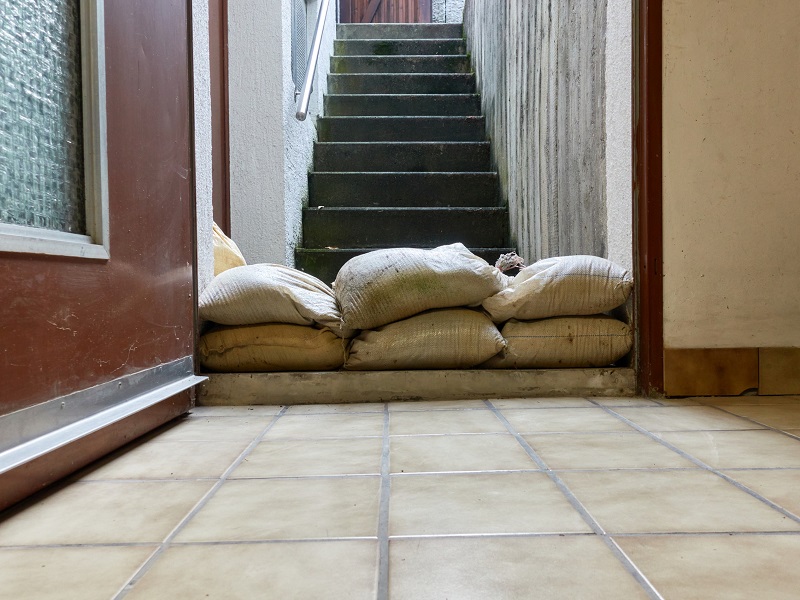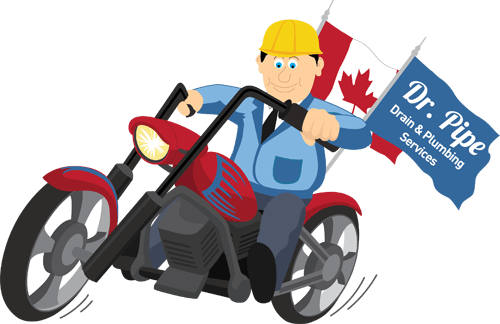Give us a call today: 416 663 4777 for a free upfront estimate!

Regardless of what you do or what steps you take, a basement is always going to be prone to flooding under the right conditions. It makes sense right? Because water is always going to run from high to lower ground. This means that you might have an unwanted swimming pool during a Toronto basement flooding. However, what most people do not know is where the water actually comes from during such an incident.
Problem #1 – Rain, Rain Go Away!
Rain is one of the most common culprits behind Toronto basement flooding. If you have an excessive amount of rain over a short period of time (which is very possible in Toronto) it can overload our waterproofing systems. This means that the water is going to push in through the cracks of our foundation, because the earth around the basement is saturated.
Problem #2 – A Downward Slope – Problems Later On
The grade of your lawn (the slope of your lawn) is also another contributing factor of Toronto basement flooding problems. You always want your lawn to slope away from your home, because this pushes the rainwater away from your foundation and towards the sewer system. Take a walk around your home when it is raining, this is going to help you ensure that the lawn is not the cause of your Toronto basement flooding issues. You know that you have a problem when you see water pooling next to your house.
Problem #3 – Backup Leads To Problems
Another problem that often causes Toronto basement flooding is a sewer backup. Most of the suburban homes in the Toronto area have a sewer tie-in line. This is often lower than the floor of the basement itself, meaning that the dirty water from sinks, toilets, and tubs can be drawn away from your basement. However, if this sewer line becomes damaged or clogged, it can lead to all that water coming right back to your home. This is going to lead to some serious Toronto basement flooding.
Problem #4 – A Sump Pump Failure
In communities that are built on marsh- or swampland, a failure of your sump pump can lead to some serious flooding damage. Sum pumps act as a fail-safe by mechanically pumping out excess water when the water is coming into your home. It is not only good to have a sump pump installed (in combination with backwater valves), but in case the primary pump fails, you want to be sure that you have a backup sump pump.
How to Stop Your Basement from Flooding

Spring thaw, rainstorms, and sewer backups can lead to basement flooding problems for homeowners in Toronto. If you’re a homeowner in the city, you’ll need to make basement flooding prevention a top priority. After all, who wants to spend thousands of dollars – or possibly tens of thousands of dollars – to fix damages caused by water infiltration?
Some Tips That Will Help You To Keep Your Basement From Flooding
1. Backwater Valve Installation and Regular Maintenance
A backwater valve is a critical piece of equipment that every Toronto homeowner should have installed in their sewer line. This device contains a flap that keeps water or sewage from flowing towards your residence. The flap rises and closes if the direction of the water or wastewater starts to flow towards your residence. Fortunately, the City of Toronto offers rebates for backwater valve installation through its Protective Plumbing Rebate program. For instance, there’s a $500 rebate for an indoor storm backwater valve installation. Rebates of different dollar amounts are available for other types of backwater valve installations.
2. Sump Pump Installation and Regular Maintenance
Is your sump pump in good repair? You need to conduct routine checks to be certain that it’s draining correctly. It’s also a good idea to have a licensed plumber perform annual inspections to look for possible pinhole leaks, pipe failure, tree root encroachment, or other issues. Toronto’s Protective Plumbing Rebate program also covers sump pumps – as long as the abovementioned qualifications are met. A rebate of $1,250 is available if you install a sump pump with battery backup power.
3. Weeping Tile Installation and Regular Maintenance
Weeping tiles are porous pipes that serve as a drainage point to get rid of water that has gathered at the base of your home’s footing or foundation. Also referred to as drain tiles or drainage tiles, weeping tiles drain water right into a sump where the collected water can then be eliminated courtesy of a sump pump. It’s important to know if your weeping tiles are not working. If there are problems, the ground around our residence will exhibit pooling water.
4. Making Sure If Your Downspouts and Gutters Work Properly
You need to ensure that your downspouts adequately divert water from the foundation of your home. If the downspouts don’t extend far enough away from your home, you can buy extensions that will make it easy to keep water from pooling too close to your home.
If your downspouts, gutters, grates, window wells, and drains are obstructed, you will run the risk of flooding. Keep these things clear of leaves, dirt, twigs, and other things that can lead to blockages, overflow, and flooding.
5. Doors & Windows Inspection
As you look to prevent flooding, don’t forget your doors and windows. This is especially the case as it relates to your basement doors and windows. Conduct a visual inspection to see if there are any issues. As needed use caulking and weather stripping to prevent water infiltration. If your windows and doors are the worse for wear, replace them.
6. Making Sure That Your Sprinklers Installed Correctly
Do you have underground sprinklers on your property? You’ll want to direct the heads properly so that the water doesn’t land near the foundation of your home. Also be sure to check that the system is working properly and that there are no leaks.
7. Sewer Service Pipe Inspection
When it comes to the sewer service pipe, there is your end of the pipe and there is the city’s end of the pipe. If the water in your kitchen sink takes forever to go down the drain or if you need a plunger to get your toilet to flush, you need to call in a licensed plumber right away. A licensed plumber will use a special camera to determine the extent of your drainage problem. If the clogs, obstructions, or damage is on your end of the sewer service pipe, you will be responsible for fixing it. If the problem is on the city’s end of the sewer service pipe, then the city will need to dispatch staff to perform the necessary repair.
8. Storm Sewer Pipe Regular Maintenance
A storm sewer pipe is designed to handle rainfall runoff. It is not, however, intended to carry any wastewater or to handle hazardous waste. What can you do to ensure your storm sewer pipe remains in good repair? You should steer clear of pouring things into your storm sewers as well as remove debris, leaves, and other things from the storm sewer drain. As well, you should take hazardous materials like paints, cleaners, and solvents to a hazardous waste collection facility. Pouring them down the storm sewer is a big no-no.
9. Outside Faucets Freezing Avoidance
Turn off any outside faucets during the cold weather months. If you don’t, there’s a chance that the pipes will freeze, and this can cause pipes to burst. You should also insulate your sump pump discharge pipe. A licensed plumber will be able to help so that you can avoid problems that will lead to expensive repairs.
Why Getting Wet Basement is Dangerous?
The first thing that you want to do is remember that a wet basement can be dangerous. There are a number of different factors that you have to take into consideration with Toronto basement flooding. These include:
- Structural damage – This might not be common, but it might occur under a few certain conditions. This leads to the weakening of ceiling structures and walls. If you believe that a flood might have compromised the structural integrity of your basement, do not attempt to go in.
- Chemicals – You might be exposed to a wide range of contaminants when you clean your basement. This includes anything that might have come in through the floodwater as well as the cleaning agents that you use. Make sure that you limit exposure and keep the area well ventilated.
- Pollutants – It is possible to transmit disease with sewage, because of the many bacteria that it contains. There might even be raw sewage in your basement if the floodwater in your basement originated from the sanitary sewer.
- Gas leaks – Depending on the severity of your Toronto basement flooding, you might have issues with a gas leak. Leave the house right away when you smell gas.
- Electrical shock – There is a legitimate risk of electrical shock if your basement is wet. If you want to be sure that it is safe to go into your basement, make sure that you turn off the power to your home at the main breaker switches.
As you can see, there are many different reasons as to why you might struggle with Toronto basement flooding. If you do have these problems, it is always a good idea to have the qualified professionals at Dr. Pipe Drain and Plumbing Services take a look for you. This is going to ensure that these problems are not only dealt with quickly, but .
Give us a call today: 416 663 4777 for a free upfront estimate!




